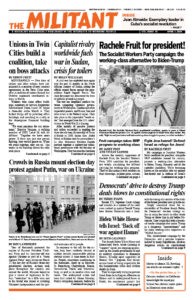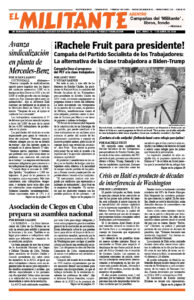MONTREAL — Common Front Quebec union federations representing 420,000 public sector employees, including hospital, education workers and teachers, announced Feb. 23 that union members had voted by 75% to accept a new contract with a wage increase of 17.4% over five years, nearly twice the government’s original offer. Retroactive to April 2023, wages will go up 6% the first year.
The 66,000-member Autonomous Federation of Education (FAE) narrowly accepted an agreement as well. The last FAE local’s yes vote came in at 50.58%.
This ends a fight that saw 11 days of province-wide strike action last November and December involving up to 600,000 union members. FAE teachers struck for 22 straight days.
The Interprofessional Health Federation of Quebec (FIQ), representing over 80,000 public workers, mainly nurses, is still negotiating. The government refuses to address their concerns on working conditions and forced overtime.
“This is not a blank cheque for the government,” said Common Front union representatives. “There’s still a lot of work to do to improve the accessibility and quality of public services.” The votes on job-specific agreements on working conditions were substantially closer than those approving the wage offer.
Several teachers met with this Militant reporter to discuss the strike and its outcome. They stressed the fight strengthened unity and union pride, as they look to future battles.
Teachers won widespread support from parents and other workers as they fought to change conditions that degrade learning conditions, demanding more teachers in each classroom and more help with special needs students.
“They’re going to pay us more to increase our workload. But I don’t want overtime, I want resources to do my job,” FAE pre-school special education teacher Rosaline Meunier said, reflecting workers’ concerns that the contract fell short in these areas.
“The whole public sector faced a hermetically sealed government,” primary school teacher Lola Fredj told the Militant. “We wanted a plan,” said another, “something tangible, like by 2030 there will be fewer students per class.” But the agreements on working conditions are stated as intentions, or conditional on availability of personnel. “Yet we planted seeds,” said Fredj. “We didn’t strike for nothing.”
Union members have gained confidence. “There were teachers who didn’t see themselves as unionists, but picketed three or four times a week because ‘things have to change,’” said primary school teacher Rachel Hyppolite. “We got to know each other,” explained Meunier. “We’ve created solid teams.”
Hyppolite described joint action between unions, like picket lines on all four corners uniting FAE teachers with Common Front hospital union members in noisy joint rallies.
Broad support from parents, labor
“I’ve been a teacher for three rounds of negotiations over the past decade, and this is the first time I’ve seen such support,” Hyppolite said. “It was thrilling.”
“Parents asked how they could help, they were angry for us!” said Fredj.
“Shoppers gave me the thumbs up, and store owners waved payment for coffee and muffins,” said primary school teacher Jennifer Alvarez Nadeau.
“The Steelworkers union gave money and joined us. That’s opened the door, we’ll do the same for them,” said Meunier, underlining the importance of solidarity from industrial unions. Unifor and the Public Service Alliance of Canada, the federal government workers’ unions, were among those that gave financial as well as political support.
“The government is asking us to choose between better pay and quality care for the population. It is shameful to frame the issues in this way,” the nurses’ federation declared Feb. 18. The real problem “is the network’s inability to provide access to safe, quality care to the entire Quebec population.”
The FIQ has called a solidarity rally in Quebec City, March 16. Their banner is, “Our working conditions are your care conditions.”

